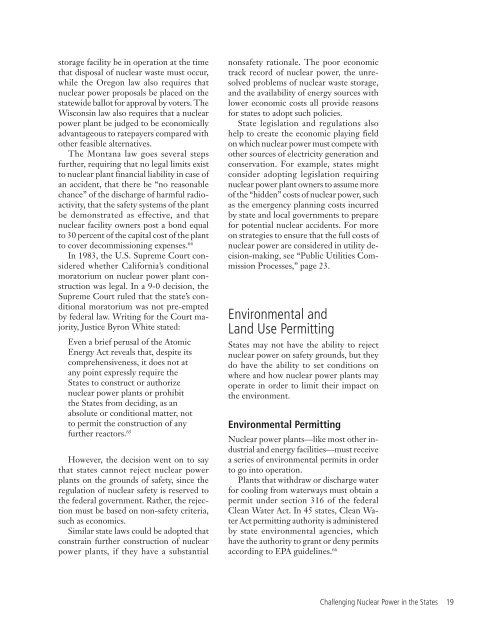Download Report (PDF) - CalPIRG
Download Report (PDF) - CalPIRG
Download Report (PDF) - CalPIRG
Create successful ePaper yourself
Turn your PDF publications into a flip-book with our unique Google optimized e-Paper software.
storage facility be in operation at the time<br />
that disposal of nuclear waste must occur,<br />
while the Oregon law also requires that<br />
nuclear power proposals be placed on the<br />
statewide ballot for approval by voters. The<br />
Wisconsin law also requires that a nuclear<br />
power plant be judged to be economically<br />
advantageous to ratepayers compared with<br />
other feasible alternatives.<br />
The Montana law goes several steps<br />
further, requiring that no legal limits exist<br />
to nuclear plant financial liability in case of<br />
an accident, that there be “no reasonable<br />
chance” of the discharge of harmful radioactivity,<br />
that the safety systems of the plant<br />
be demonstrated as effective, and that<br />
nuclear facility owners post a bond equal<br />
to 30 percent of the capital cost of the plant<br />
to cover decommissioning expenses. 64<br />
In 1983, the U.S. Supreme Court considered<br />
whether California’s conditional<br />
moratorium on nuclear power plant construction<br />
was legal. In a 9-0 decision, the<br />
Supreme Court ruled that the state’s conditional<br />
moratorium was not pre-empted<br />
by federal law. Writing for the Court majority,<br />
Justice Byron White stated:<br />
Even a brief perusal of the Atomic<br />
Energy Act reveals that, despite its<br />
comprehensiveness, it does not at<br />
any point expressly require the<br />
States to construct or authorize<br />
nuclear power plants or prohibit<br />
the States from deciding, as an<br />
absolute or conditional matter, not<br />
to permit the construction of any<br />
further reactors. 65<br />
However, the decision went on to say<br />
that states cannot reject nuclear power<br />
plants on the grounds of safety, since the<br />
regulation of nuclear safety is reserved to<br />
the federal government. Rather, the rejection<br />
must be based on non-safety criteria,<br />
such as economics.<br />
Similar state laws could be adopted that<br />
constrain further construction of nuclear<br />
power plants, if they have a substantial<br />
nonsafety rationale. The poor economic<br />
track record of nuclear power, the unresolved<br />
problems of nuclear waste storage,<br />
and the availability of energy sources with<br />
lower economic costs all provide reasons<br />
for states to adopt such policies.<br />
State legislation and regulations also<br />
help to create the economic playing field<br />
on which nuclear power must compete with<br />
other sources of electricity generation and<br />
conservation. For example, states might<br />
consider adopting legislation requiring<br />
nuclear power plant owners to assume more<br />
of the “hidden” costs of nuclear power, such<br />
as the emergency planning costs incurred<br />
by state and local governments to prepare<br />
for potential nuclear accidents. For more<br />
on strategies to ensure that the full costs of<br />
nuclear power are considered in utility decision-making,<br />
see “Public Utilities Commission<br />
Processes,” page 23.<br />
Environmental and<br />
Land Use Permitting<br />
States may not have the ability to reject<br />
nuclear power on safety grounds, but they<br />
do have the ability to set conditions on<br />
where and how nuclear power plants may<br />
operate in order to limit their impact on<br />
the environment.<br />
Environmental Permitting<br />
Nuclear power plants—like most other industrial<br />
and energy facilities—must receive<br />
a series of environmental permits in order<br />
to go into operation.<br />
Plants that withdraw or discharge water<br />
for cooling from waterways must obtain a<br />
permit under section 316 of the federal<br />
Clean Water Act. In 45 states, Clean Water<br />
Act permitting authority is administered<br />
by state environmental agencies, which<br />
have the authority to grant or deny permits<br />
according to EPA guidelines. 66<br />
Challenging Nuclear Power in the States 19




